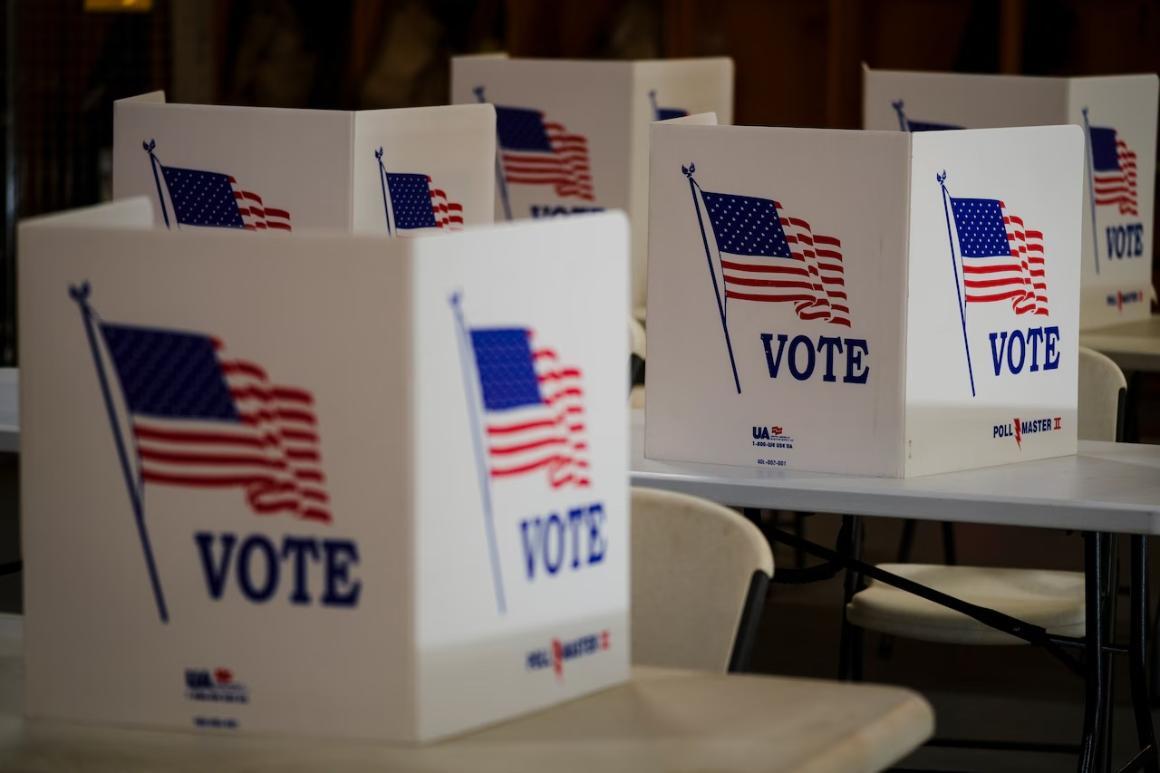
Voting booths are set up at a polling place in Newtown, Pa., Tuesday, April 23, 2024. Matt Rourke/AP Photo
John Pelissero is director, government ethics, and Ann Skeet is senior director, leadership ethics (@leaderethics), both with the Markkula Center for Applied Ethics at Santa Clara University. They are among the co-authors of “Voting for Ethics: A Guide for U.S. Voters." Views are their own.
This article originally appeared in Penn Live Patriot News and is republished with permission.
With only a handful of days left until the Nov. 5 presidential election, a small but critically influential share of likely voters is still undecided about who will receive their vote.
Estimates suggest that between five and 10 percent of voters still have not made up their minds between casting a vote for former President Donald Trump or Vice President Kamala Harris. That small percentage of undecided voters represent millions of potential votes, and could be the difference in determining who will win.
We are at the point where undecided voters need to decide. They have an obligation to become informed and an ethical duty to vote as part of the rights they receive as citizens.
Who are the undecided voters? The bulk of them seem to fall within several categories. First are likely voters who simply are not paying attention to the race at this time and will make their decision closer to election day. These voters are not yet prepared to make an informed choice.
A second category are independents and swing voters who are paying attention to the race, yet still assessing their options. This is the category of voters that most often will shape the outcome of the election. In fact, among likely voters, the largest share of undecided voters at this moment are among independents.
Another group of undecided voters are those who dislike the binary choice in the nominees of the Democratic and Republican parties. This group tends to drift toward third-party candidates, if they decide to vote, and may stay away from the polls altogether.
And then there are Republican and Democratic party members who are unhappy with their own party’s nominee. This includes many in the GOP who are dissatisfied with Trump and the MAGA movement that has taken over the party. Among Democrats, some are unhappy about how Harris came to be the nominee after President Joe Biden dropped out of the race or feel they do not yet have adequate information about Harris’ positions on key issues. Some consider not voting at all.
What more information do the millions of undecided voters need? This is a perplexing question because what voters may need is likely already available. Trump’s record and his campaign promises are well known to anyone paying attention to the race. The GOP convention ratified a platform that is largely a tribute to Trump and the ideas of the MAGA movement. Trump has debated twice, once against President Joe Biden and another against Harris.
Harris may still have some opportunity to expand on her policy plans, but little is truly unknown. The Democratic party adopted a policy platform at its August convention, shaped by the Harris campaign. The debate with Trump was generally thought to be a strong performance by Harris , especially among independents. But it seems that few voters changed their minds afterwards.
Information on political candidates has never been easier to obtain. An informed voter is an ethical voter, prepared with the facts to make an educated choice. The challenge for voters, including the undecided, is to know what are credible, reliable, and factual sources of information. For these reasons, they should not rely on AI-generated information, as AI systems are prone to inaccuracies and bias. Those who are undecided should avoid consuming too much from propaganda sites and questionable social media that lack the characteristics of ethical campaign communications. Those characteristics are that the information shared is true, fair, and relevant.
Therefore, voters must rely upon information sources that are ethically produced to embrace the virtues of honesty and integrity, that are fair and balanced, and which seek to advance the common good for our democracy. Undecided voters should look at and beyond the campaigns’ websites. Their search for information should be based on reputable journalists and news organizations, trustworthy digital media, and websites that promote fair and honest reporting on the candidates and their campaigns.
Undecided voters should know by now that they are the decision makers in the battleground states of Arizona, Georgia, Michigan, Nevada, North Carolina, Wisconsin, and here in Pennsylvania, that will determine the outcome of the electoral college vote. The undecided should recognize the pivotal role they will play in the outcome of the election and be engaged and informed on the candidates and prepared to cast a ballot. Perhaps undecided voters can draw inspiration from the words of John W. Gardner, founder of Common Cause, and a Republican who served in the cabinet of Democratic President Lyndon B. Johnson, “Liberty and duty, freedom and responsibility. That’s the deal.”